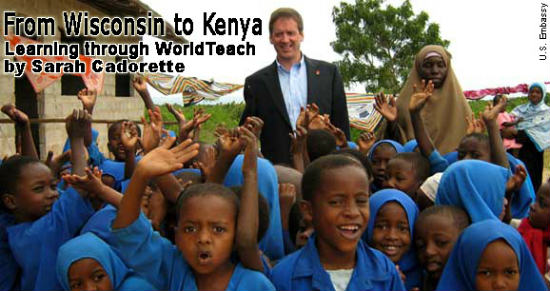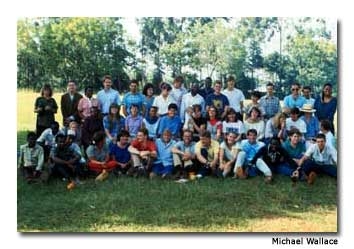

Mark Green’s Time in Kenya
Mark Green believes Wisconsin and the rural villages of Kenya have more in common than many people assume. In fact, he believes it so much that he built his career on it.
“People always scratch their heads and wonder, ‘How does Kenya relate to Wisconsin?’” says Green. But it was his time in Kenya that motivated him to run for the Wisconsin Legislature.
In 1987, Green and his wife, Sue, were recent law school graduates with a desire to see Africa.
“My father is South African, so we very much wanted to live and work in Africa,” says Green, who briefly lived in South Africa growing up. “Africa’s always been in our hearts.”
Working in WorldTeach
Working as an intern at a federal agency, a fellow intern told Green about WorldTeach, an organization formed the previous year that sends volunteers to teach in partner countries. Green and his wife were impressed by the organization.
“WorldTeach was able to match us up with a great opportunity in a relatively short period of time and there wasn’t a lot of bureaucracy – very efficient.
The team provided the support we needed without intruding upon the volunteering experience.”
Within the year, they were headed for remote western Kenya. It was there that Green had the time to read, reflect and think, while at the same time doing “meaningful work.”
“It gave me the chance to see what is important versus what seems to be important,” says Green.
Kenyan Leaders
Green saw how the local Kenyan leaders cared for their community and how they worked to help their people.
He found it “intoxicating,” and, upon returning to his home state of Wisconsin, he felt the need to assist those in his community.
“Even though Green Bay isn’t Kenya, I wanted to help those around me,” Green says. In 1998, Green was elected to the U.S. House of Representatives from Wisconsin.
Inspired by his year teaching in Kenya, he worked to pass laws targeting HIV/AIDS prevention and economic development in Africa and was a member of the African Affairs Subcommittee.
“Seeing people back then in Kenya struggling to reach daily challenges – it sensitizes you,” says Green.
Working As A Election Monitor
And, as luck would have it, the State Department sent Green in 2002 to work as an election monitor in the very area of Kenya in which he had taught.
“In 1987 and ‘88, the village only had one telephone, and it was a wind-up phone,” recalls Green. When he returned 14 years later, however, he found times had changed.
“I went back to the school where I taught to find old students, and I remember going to the gateway of the school and literally stopping people and asking, ‘Do you know so-and-so?’”
After asking a young boy if he knew Niva, a former student of his, he was astonished to see the boy pull out a cell phone.
He asked himself, “What is this? Where does this come from? This is supposed to be a dial-up phone!”
Despite his initial shock, it was because of cell phones that Green was able to reach his former students, some of whom he still is in contact with.
Green’s Experience of Africa
Like the village in Kenya, Green’s experience of Africa began to evolve. Five years after returning to Kenya to monitor the election, Green again was sent to Africa in August 2007 – this time as U.S. Ambassador to Tanzania.
The difference between traveling to Africa as a volunteer teacher and as a state official is “radically different,” says Green.
“One of the newspapers quoted me as saying to my wife, after getting off the phone with the White House, ‘Honey, we’re going back to Africa, but this time we’ll have running water, I promise,’” Green laughs from the American Embassy in Dar Es Salaam, Tanzania.
As ambassador, Green works to implement programs in Tanzania, and hopes to increase Tanzanian awareness of the deeds of American citizens.
“If I can get Tanzanians to think of, when they think of America, the clinics, textbooks we bring, volunteers teaching in the classroom, then I know I’m doing my job,” Green says.
He wants to mold America’s image in Tanzania by highlighting the “generous works of countless Americans back home in the private sector,” in non-governmental organizations such as WorldTeach.
Green’s Public Speaking

Green’s previous experience in Africa lends him credibility when speaking publicly on such subjects.
When asked to speak at the ribbon-cutting ceremony of a new school, or at other public events, Green almost always begins his remarks with a reference to his time in Kenya.
That way, he says, they “know you’ve seen it, know you’ve been on the front lines of helping Kenyans face education challenges.”
“When I recount my experience, they almost always say, ‘Oh, you’re no stranger,’” says Green.
“I’m indebted to WorldTeach,” says Green. “It shaped my career choices and I know it shaped my world view.”
“I think it’s impossible to go into a mud hut in the countryside, have a meal, and not carry that with you for the rest of your life.”
If You Go
WorldTeach
www.worldteach.org
Tanzania Tourist Board
www.tanzaniatouristboard.com
Kenyan Ministry of Tourism
www.tourism.go
Sarah Cadorette is a writing student at Emerson College in Boston. She hopes to one day explore the warmer climates as a travel writer. This is her first piece for GoWorldTravel.com.
